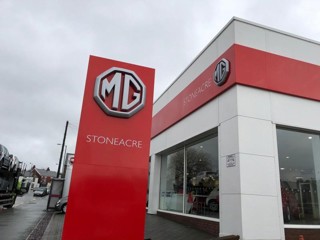Customer loyalty is essential to car manufacturers. But does brand loyalty matter to car buyers? And what can car brands do to drive stronger loyalty?
Brand loyalty declining
A study by S&P Global shows that brand loyalty – measured by the percentage of customers who stay with the same brand for their next purchase – is declining across the luxury car market.
Land Rover, Audi, Mercedes-Benz, and Volvo have all experienced a drop in brand loyalty over the period of January 2020 to April 2022.
According to the study, Land Rover has suffered the biggest decline. One reason for this could be the lack of new Range Rover releases since 2012. However, the brand is releasing its latest model this year, which is expected to attract many SUV enthusiasts.
Tesla’s loyal customer base is strong; an impressive 62% of buyers returned to the brand for their next vehicle purchase.
Industry faces many challenges
Supply chain issues may have contributed to declines in loyalty; buyers may be more inclined to purchase models that are in stock, rather than waiting months (or years) for their desired model to be available.
On top of this, inflation has caused car prices to skyrocket. Rising interest rates are forcing customers to choose affordable models or stick with their current vehicle for as long as possible.
But one thing is certain: car brands could do more to drive loyalty in their customers.
To understand what automakers can do to drive better brand loyalty, let’s explore the challenges faced by the industry and their potential solutions.
A complicated buying journey
The car-buying process can be complex and frustrating for customers, who have access to many different sources of information.
Consumers are doing more homework before buying, and the auto purchase journey is increasingly influenced by online channels.
A decade ago, the average car customer visited a dealership five times to research their next purchase. Today, the average customer makes two visits or less.
Buyers are spending more time researching online, getting referrals from friends and family, or speaking with car mechanics or specialists.
Since most research happens before visiting a dealership, there is a huge opportunity for brands to influence customers at this stage; 48% of vehicle owners haven’t yet decided if they will choose the same car or brand again next time.
Lack of customer data
Many car brands don’t collect enough customer data. This makes it difficult to understand customer needs, wants, and preferences.
Car brands cannot always rely on information from third parties such as comparison websites, dealerships, and garages. Their information is often fragmented and doesn’t provide the level of detail to get clear, actionable insights.
To influence customers, brands need detailed behavioural data.
Loyalty technology provides solutions
Brand loyalty starts with an easy customer experience. To make the purchasing journey easier, a brand should be able to personalise.
Personalisation is all about giving customers what they want, when they want it. This means helping customers find the perfect car for their needs and budget.
Loyalty programs make it easy for companies to collect customer data at scale.
Existing (and potential) customers can sign up for a loyalty program and input personal information and product preferences.
The loyalty program can then track all customer activity, from online interactions to in-store transactions.
Brands can then create a more personalised experience across the buying journey, from initial research to post-purchase.
In an industry where data is fragmented, a loyalty program is an innovative solution to connecting all the customer touchpoints.
AI insights
Combining customer data collected via a loyalty program with machine learning technology is a powerful way for brands to understand customers on a deeper level.
AI can help identify customer lifetime value, predict churn, and uncover micro audiences. This improves a company’s ability to anticipate customer needs.
Use rewards to drive customer behaviours
Existing customers often feel that only new customers get rewarded with the best offers.
This drives them to shop around, looking for brands that offer great ‘new customer’ packages.
That’s why it’s vital to reward and recognise existing customers. This strategy works especially well if a brand offers personalised rewards.
For example, an automotive brand could reward existing customers for purchasing branded car parts and accessories.
Customers could also earn points each time they service their car at a branded garage. Rewards can get even better if a customer stays loyal to a brand.
Think discounts, upgrades, free services, or even brand experience days.
Rewarding loyalty is a long overdue practice in the automotive industry.
Rewards help build relationships. And when a brand has a closer relationship with its customer, they are more likely to win that customer over when it comes to their next car purchase.
Author: Achille Traore, chief executive, White Label Loyalty


















Login to comment
Comments
No comments have been made yet.